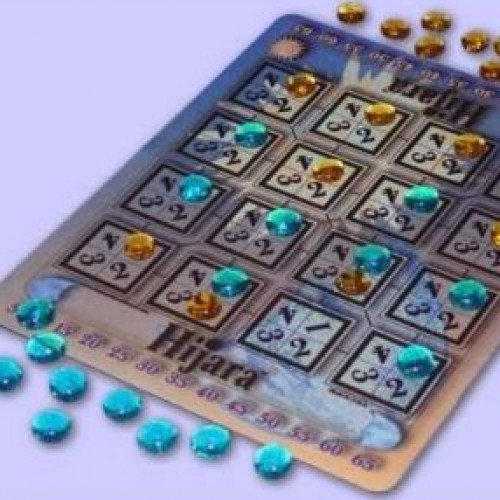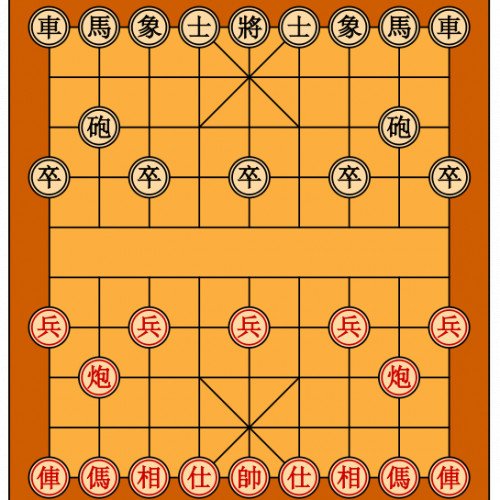HIJARA VS XIANGQI

HIJARA
Hijara is a two-player abstract strategy board game played with small stones. It has been likened to a three-dimensional game on a two-dimensional board. The game was designed by Martin H. Samue| and first printed, as Excel, by American Airlines in their inflight magazine, American Way, on December 24, 1985 and July 22, 1986. It has been sold commercially as Eclipse in 1994, and Hijara (the Arabic word for small stones) in 1995, 2003 and 2006. The original commercial edition of Hijara has a game board of 16 squares, divided into 4 sections numbered 1 through 4 and a score-keeping "ladder" on either end. Players choose either yellow or blue and use 32 same-color stones plus one score-keeper each. Blue starts and players take turns placing their stones, one at a time, on any square, building on those already on the board, to complete and block point-scoring combinations. When a player places a stone on a square, it must be placed in the lowest-numbered open section in that square. So, for every square, the first small stone must be placed on the 1, second on the 2, etc. The game starts with an empty board, and ends with a full board with 3 ways to score points when placement of four same-color stones is completed in any of the following combinations: 10 points - 4 stones of the same color on 4 numbers of a kind in a row - horizontally, vertically, or diagonally. 15 points - 4 stones of the same color in numerical sequence (i.e. 1-2-3-4) - horizontally, vertically, or diagonally. 20 points - 4 stones of the same color in one square. Points are won with a player's own-color stones and are always accrued, never deducted. Several point-scoring combinations may be completed at one time with a single stone. Overlooked points are forfeited and, throughout the game, players keep score on their side of the board with an extra stone of their color. The game is over when the last small stone is placed and all the numbers are covered then, by comparing accrued points totals, the player with the greater number of points is the winner of the game.
Statistics for this Xoptio

XIANGQI
Xiangqi (Chinese: 象棋; pinyin: xiàngqí; Wade–Giles: Hsiang ch'i; English: /ˈʃɑːŋtʃi/), also called Chinese chess or Elephant chess, is a strategy board game for two players. It is one of the most popular board games in China, and is in the same family as Western chess, chaturanga, shogi, Indian chess and janggi. Besides China and areas with significant ethnic Chinese communities, xiangqi is also a popular pastime in Vietnam, where it is known as cờ tướng. The game represents a battle between two armies, with the object of capturing the enemy's general (king). Distinctive features of xiangqi include the cannon (pao), which must jump to capture; a rule prohibiting the generals from facing each other directly; areas on the board called the river and palace, which restrict the movement of some pieces (but enhance that of others); and placement of the pieces on the intersections of the board lines, rather than within the squares. Xiangqi is played on a board nine lines wide and ten lines long. As in the game Go (圍碁; or Wei ch'i 圍棋), the pieces are placed on the intersections, which are known as points. The vertical lines are known as files (Chinese: 路; pinyin: lù; "road"), and the horizontal lines are known as ranks (Chinese: 線/綫; pinyin: xiàn; "line"). Centred at the first to third and eighth to tenth ranks of the board are two zones, each three points by three points, demarcated by two diagonal lines connecting opposite corners and intersecting at the centre point. Each of these areas is known as 宮 About this soundgōng, a castle. Dividing the two opposing sides, between the fifth and sixth ranks, is 河 hé, the "river". The river is often marked with the phrases 楚河 About this soundchǔ hé, meaning "River of the Chu ", and 漢界 About this soundhàn jiè, meaning "Border of the Han", a reference to the Chu–Han War. Although the river (or Hanchu boundary) provides a visual division between the two sides, only two pieces are affected by its presence: soldiers have an enhanced move after crossing the river, and elephants cannot cross it. The starting points of the soldiers and cannons are usually, but not always, marked with small crosses.